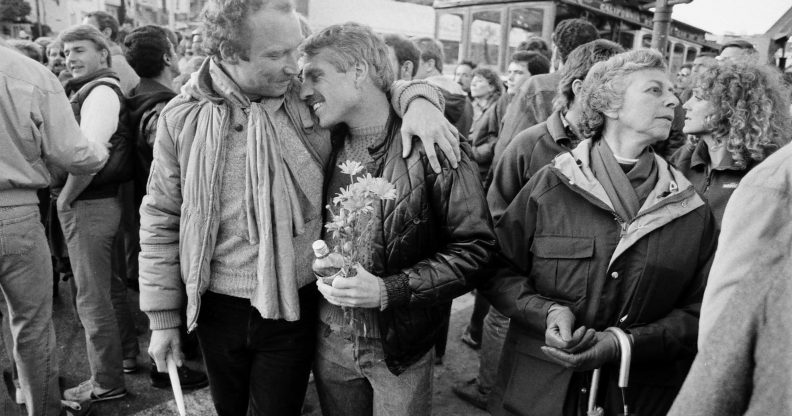Queer elders on lessons they learned during the AIDS crisis, which are helping them through coronavirus

A candlelight vigil to bring awareness to the crisis of AIDS that was affecting the gay community, 1983. (Steve Ringman/San Francisco Chronicle via Getty)
Three queer elders have explained the lessons they learned about resilience and love during the AIDS crisis, which are now helping them get through the coronavirus pandemic.
Although the coronavirus pandemic is often described as “unprecedented”, LGBT+ elders have lived in the shadow of a new and frightening disease before.
But through the tragedy of the AIDS crisis, many of them have developed life skills that are now helping them to get through COVID-19.
Three queer elders told Business Insider the lessons they learned during the AIDS crisis, that are still relevant today.
Poet and former taxi driver Davidson Garrett, 67, said he learned that having compassion for others could make all the difference.
In the 1980s, even those in the queer community who did not have AIDS themselves were forced to watch friends and loved ones get ill and often pass away.
Garrett recalled rushing to a friend’s bedside to listen to opera with him as he died.
He said: “He could barely move in his hospital bed, but he wanted me to be near him to listen to opera cause that’s what we did together.
“What I did learn from the AIDS crisis is that we all can be a part of the solution…With the coronavirus, you can’t really be there with that person.
“Call their families and let them know that you’re thinking of them and get them some compassion and love.”
Joey Terrill, 64, director of community partnerships at the AIDS Healthcare Foundation, said: “I felt like when AIDs hit, it was war. It was wartime and I had to step up and be a soldier in that war, and I’m still a soldier to this day.”
During the AIDS crisis, Terrill was working at a centre for vision loss, and he remembers meeting his first client who had AIDS, teaching him the importance of urgency.
He said: “They don’t have two weeks — they could be dead in two weeks. It was the immediacy of the way that AIDS was affecting people that altered the way we were providing services.”
Now during the coronavirus pandemic, medical providers are also facing a need for urgency and speed.
Terrill said: “Prior to a pandemic like this, we are all pretty complacent. We go about our daily lives and we never really think about the idea of transmitting a virus from touching or not touching something.”
“The urgency relates to how we can allow ourselves to get sick and die or not.
“Do we care if our neighbours get sick, [or] die or not?
“That, to me, is the urgency over whether or not I’m going to complain about not being able to go to see my sports team, or being able to go to the club and drink.”
Managing director of New York’s Gay Men’s Health Center Steve Karpiak, 74, said he has noticed that elders are being seen as “disposable” during the pandemic.
He said that the discrimination he experienced during the AIDS crisis has taught him to always show others compassion.
“How we take care of our elderly are telling about who we are,” he said. “We need to care for each other more. Caregiving is an important part of our social fabric.”

